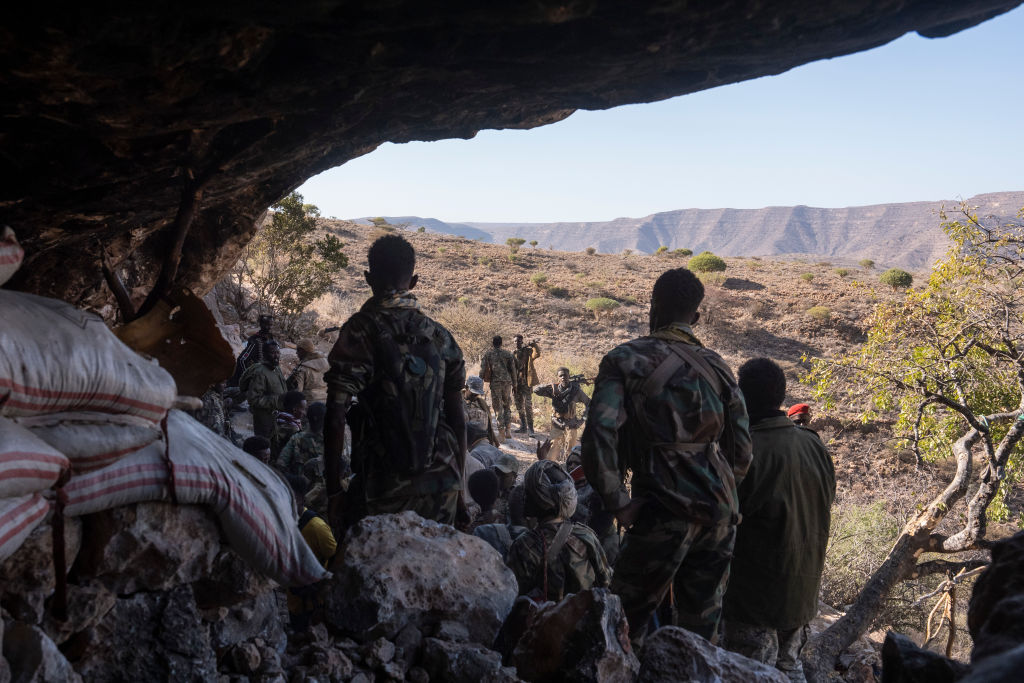As a man who views the world as one big real-estate portfolio, Donald Trump sees the potential in northern Somalia’s Puntland region. Lousy government, maybe, and definitely more than a few bad guys around. But Puntland has great winter sun and tremendous beaches, folks. It could be just the place to resettle Palestinians from the Gaza Strip.
Jordan and Egypt have all but refused to rehouse Gaza’s population and according to Israeli diplomats, Puntland has made the shortlist of new Palestinian homelands. The Trump sales pitch is that this will allow Gazans to create “far safer and more beautiful communities” than their homeland could ever offer. The Strip meanwhile, will be rebuilt into a Dubai-on-the-Med.
As with all real-estate sales pitches, however, the drawbacks of Puntland have been glossed over somewhat. For one thing, Puntland has spent the past three decades as even more of a failed state than Gaza. It hosts rampant lawlessness and poverty that makes the Strip look prosperous. It’s true that Puntland might make Gazans feel at home, but only because it, too, is a haven for hostage-takers and terrorists.
A decade ago, Puntland’s beaches were the main operating base for Somalia’s pirates, who hijacked hundreds of ships in the Gulf of Aden. And today, the caves in Puntland’s remote inland mountains are the Horn of Africa’s answer to Tora Bora, serving as hiding places for Somalia’s chapter of Islamic State.
I should know, having been kidnapped by Puntland’s pirates myself while reporting on their activities for Britain’s Sunday Telegraph in 2008. During that time, I also became well acquainted with the region’s caves, where my photographer and I were held captive.
We survived off goat meat, rice and Rothmans cigarettes. There were occasional moments of terror, such as when the gang fought a gunfight with a rival clan or when they threatened to kill us after the Telegraph refused their ransom demands. Once, they even considered selling me to a rival pirate clan further down the coast. Two of the rival gang’s pirate brethren had just been shot dead by a Royal Navy anti-piracy patrol – and they wanted revenge on the British.
Given that they were probably the first pirates Britain’s Navy had killed in several centuries, it was unfortunate timing for me to have been captured just then. But overall, we were lucky. After six grim weeks, we were released unharmed and, with hindsight, there were worse people to be held captive by. Today, the same caves that the pirates used are home to Islamic State gangs. They would probably have chopped my head off. Just two weeks ago, one of their hideouts was targeted by Trump-authorized airstrikes and when I saw the news footage, released by the Puntland authorities, it gave me a jolt. I can’t be certain, but it looked very like the cave in which we spent most of our time, in a tunnel that stretched hundreds of meters into a mountainside.
Piracy has tailed off because ships now use armed guards, but other maritime crime continues to flourish, which would give the Palestinians something to do, I suppose. Weapons shipments come and go via Yemen and other nearby war zones. And the beaches outside the main commercial port, Bosaso, are one of east Africa’s biggest people-trafficking hubs, ferrying desperate souls to the Gulf States in search of work. Any Palestinian arriving here will find as many people trying to leave.
It’s unclear how Trump plans to persuade even stateless Palestinians to stay. Puntland is poor even by African standards, and much of Bosaso is made up of shanty towns of corrugated iron and thatch. When I was there, piracy was providing the first boom time in living memory. Yet for all the pirates’ talk of being modern-day Robin Hoods, ransoming western cargo ships to help their own communities, there is little to show for the estimated $500 million they have netted. Sayeed Othman, a community leader who has worked on counter-piracy programs, tells me most of the money was frittered on new SUVs and fancy villas, or salted away in Middle Eastern bank accounts.
Indeed, Puntland’s tiny, cash-strapped government often feels more like a town council than a state. Bosaso remains the only place in the world where I have had audiences with three government ministers in a single day, all the result of random encounters. The security minister came to the airport in person to scold me for not having the right visa paperwork, making me present him with a written apology on the spot. The interior minister I bumped into in the car park of Bosaso’s main hotel, interviewing him while he sat on the hood of a car smoking a cigarette. Upstairs in the hotel business center, a man chewing the stimulant khat, a shrub popular in Somalia, introduced himself as the minister of health.
The only thing going for the Puntland plan is that the area has as much self-belief as Trump does. It, too, dreams of becoming a Dubai-style statelet, and to that end, its ministers have welcomed the idea of receiving Gazans (as long as they come voluntarily). Some 10,000 Yemeni refugees arrived a decade ago, fleeing from the civil war, and they brought with them much-needed technical skills that helped modernize the Puntland economy. Puntlanders think that cooperating with Trump’s plans could bring American largesse to ensure the resettlement succeeds. In the words of Abdullahi Mohamed Jama, an ex-Puntland government spokesman: “It’s best to take advantage of the unplanned opportunities that sometimes arise.” Both Hamas and the Palestinian Authority have rejected the idea of resettling anywhere, but it’s not clear they’ll have much choice.
Finding Mr. Fox, a BBC investigative podcast presented by Colin Freeman and Yemisi Adegoke, is out now. This article was originally published in The Spectator’s May 2025 World edition.


























Leave a Reply